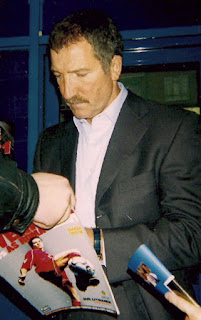The postponement of the Manchester United vs Liverpool match was a landmark occasion. Both clubs have global appeal and the events that took place will have been seen around the world. The violence that happened is inexcusable but it should not take away from the purpose of the anti-Glazer protest.
It was not just about Manchester United's involvement in the European Super League that ignited the protest. It has been fifteen years of the Glazers' poor ownership of England's biggest football club. Fans are no longer going to be trample over, or 'legacy fans' as the Glazers view them. It is their football club and the people who run them are not fit for purpose.
In truth, the Glazers have never been trustworthy owners. How they came to buy Manchester United in 2005 in the first place was very telling about how they would be as owners. The family bought a 2.3% stake in 2003 which rose to 30% the following year. By June 2005, they had 98% of United. To achieve this, the Glazers took out £275 million "payment in kind" hedge fund loans with an interest rate of 14.25%. Added to this a £265 million bank loan, the family loaded the club with debt that now stands at almost £500 million.
 |
| Graeme Souness enraged Manchester United fans with his punditry after the protests ahead of the Liverpool match Photo by RoverTheBendInSussex |
The family, howevr, have continued to earn money at the expense of the club. The Glazer children shared a dividend worth £18 million even though the Glazers have taken out more than £1 billion since the takeover. All this has happened while Manchester United have declined on the pitch.
Sir Alex Ferguson was very influential in the football areas of the club and after he left as manager, the club has not been at the same level. Ed Woodward, the investment banker who helped the Glazers complete the takeover, was rewarded by being employed in financial roles at the club. In 2013, he replaced David Gill as CEO despite a lack of understanding in football politics.
Woodward assumed responsibility for transfers and contracts and has been criticised for his part in United's poor performances in the market. Ferguson retired in 2013 after their last league title but the club has finished seventh, fourth, fifth, sixth, second, sixth and third. They have been nowhere near challenging for the Premier League and only winning cup competitions shows the downward trajectory under what is now four managers post-Ferguson.
At the heart of the Glazers' problems is how they treat a football club. To them it is a business, underlined by their frontline involvement in the European Super League, but for fans across the world, they are social institutions that should be protected. The Glazers are custodians that are not using Manchester United in the club's best interests.
It is why certain punditry after the protest was infuriating. Graeme Souness on Sky Sports said that the "misdirected" anger from fans comes down to Manchester United "not being top dogs" and that they have only been annoyed "since Fergie stopped."
If this is true, then why were the Glazers taken away by the police for their own safety on their first visit to Old Trafford in 2005? Why were 'Love United Hate Glazer' stickers placed on seats at Old Trafford in May 2006? Why did the green-and-gold campaign take place in 2010? Most importantly, why was a new club, FC United of Manchester, founded in 2005 in direct opposition to the Glazers' ownership? All these anti-Glazer events took place when Ferguson was still manager.
Jermaine Jenas on Match of the Day also towed a similar line. He did not understand why Manchester United fans would have a problem with their owners as they have "won a lot of big trophies" and "spent a lot." A pundit's job is to inform the viewer, not for Jenas to say he doesn't know why. He should be educating himself around these issues and the answers would come.
Thank goodness for Jamie Carragher, who rarely says a wrong word. Lazy punditry, as he put it, was the heart of the aftermath. Footballers have a better understanding of what happens during match but when something as nuanced as the Glazers' ownership is discussed, it shows the difference between those who understand these issues and those who turn up underprepared for their job. Do the research.
And as Carragher rightfully explained, the European Super League was merely the tipping point of the Glazers' 15-year reign. It was a step too far that reinforced their intention to use Manchester United as a profit-making operation while the debt mounts up. It was not down to playing European football on a Thursday night.
Comments
Post a Comment